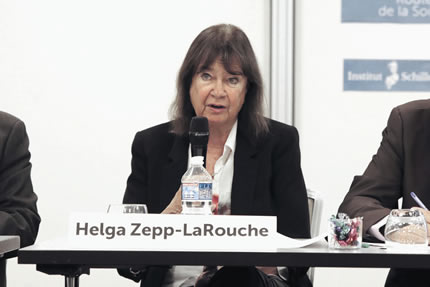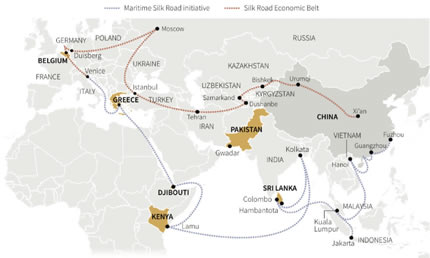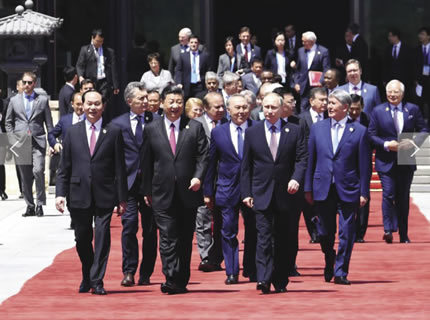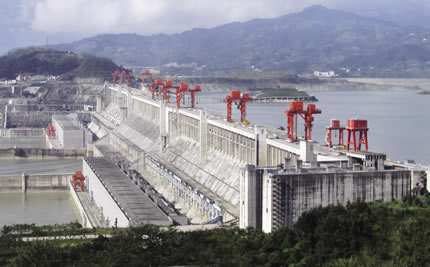Paris Seminar: Helga Zepp-LaRouche
The New Silk Road:
Succeed with Win-Win Cooperation with China
Keynote Address by Helga Zepp-LaRouche
View full size
Helga Zepp-LaRouche |
This is a transcript of the opening address by the founder of the Schiller Institutes and chairwoman of the German Schiller Institute, Helga Zepp-LaRouche, to the Paris seminar cosponsored by the Schiller Institute in France and the Académie de Géopolitique de Paris, on Tuesday, Oct. 24.
An edited transcript of her remarks follow. See the video of her address, along with the video of Solidarité et Progrès President Jacques Cheminade’s presentation.
Helga Zepp-LaRouche: Ladies and Gentlemen, Excellencies, Dear Guests: I would like to approach the China question from the standpoint that there is, right now, a total clash between what I would call the old paradigm and the new paradigm, and that new paradigm has been very little understood in the West. I would like to start by talking about the event that just happened in China, the 19th National Congress of the Communist Party of China (CPC) and especially the perspective outlined by President Xi Jinping for the next 35 years.
First, you should know that I was in China for the first time in 1971 in the middle of the Cultural Revolution, and therefore I have the advantage of having seen first-hand the absolutely incredible development of the Chinese miracle. China has developed in the last 40 years, since Deng Xiaoping’s reforms, through the most incredible economic transformation of any country on the planet. It has lifted 700 million people out of poverty over the last 30 years. It now has a growing middle class of people who are doing very well economically, and it has the perspective of eliminating all poverty by 2020, which is only three years from now, for the remaining 42 million poor people in rural areas.
What Xi Jinping did first in his speech, was to review what has happened in the last five years, since he became General Secretary of the CPC: He developed the inner and western regions of China, and that was very difficult, because these areas are mostly desert. It was a tremendous challenge. But China has done an incredible job in doing exactly that.
One year after Xi Jinping had become General Secretary, he announced in 2013 the New Silk Road, the Belt and Road Initiative (BRI), in Kazakhstan, and in the four years since this project was put on the agenda, again, the most breathtaking development has taken place, where now, about 70 countries are actively participating in this project.
Xi announced that by 2020, China should be a moderately prosperous country; by 2035 China should be fully modernized, and by 2050 it’s supposed to have become a “strong, democratic, culturally advanced, harmonious and beautiful nation.” Xi emphasized that in China’s development, they were adding miracle upon miracle, and were drawing on the 5,000 years of China’s history, in which China contributed many advances to humankind, and were also developing a spirit of science, of innovation, and excellence for the future. He mentioned fourteen times in his speech that the aim of all of this is that people would have a better and a happy life. Now, I have not heard that said from any Western politician for a very long time. It is in the U.S. Declaration of Independence that the “pursuit of happiness” is an inalienable right of all people, but if I look at the political processes in Europe or the United States, “happiness” is not a subject of discussion as the purpose of policies.
View full size |
What China has done is to take the Chinese economic miracle, and offer it through the Belt and Road Initiative to all participating countries, and that has already transformed all of Asia, much of Europe, Eastern Europe, Southern Europe, Africa, and Latin America. At this Party Congress, there were many foreign leaders who said they will now take the inspiration of the Chinese model for their own development.
While this has been happening in China, you have had a peak of unprecedented attacks on China in the Western media. In Bloomberg, Time magazine, and the Wall Street Journal, you had a barrage of articles accusing China of merely attempting to gain global power, to replace Anglo-American imperialism with Chinese imperialism; that it’s a grab for raw materials; that Xi Jinping is like Stalin, like Mao Zedong. They stop at nothing with their accusations.
So, why is it that the countries that are participating with China in the Belt and Road, 70 countries or maybe even more than 100, are all happy, that they all praise what China is doing? How can it be that there is such a complete difference in perception of what is going on? This is what I call the clash between the old paradigm and the new paradigm, because what China is offering is “win-win cooperation.” Of course China is pursuing its own interests, but it is also acting in the interest of the participating countries; so there’s a mutual benefit for both sides.
We’ve Fought for It for 26 Years
Let’s take it back a little bit: When the Soviet Union approached its last phase, in the United States the neo-cons developed a concept which they called the Project for a New American Century (PNAC), which was the idea that there should only be a unipolar world, dominated by the Anglo-Americans.
When the Wall in Berlin came down, my husband Lyndon LaRouche’s movement had an answer: We proposed the “Productive Triangle,” economic development linking Paris, Berlin and Vienna. This was the idea of transforming the Comecon countries with Western technologies through development corridors. In 1991, when the Soviet Union disintegrated, the Iron Curtain was down, and we proposed the “Eurasian Land-Bridge,” which was the idea of connecting the population and industrial centers of Europe with those of Asia through development corridors, and in 1991, we called that the “New Silk Road.”
We have campaigned for this over 26 years, but of course, if you go back to ’91, this idea was not in the interests of the Bush Sr. Administration; or of Margaret Thatcher, who called German unification the “Fourth Reich”; or even of French President Mitterrand, who opposed German reunification, so there were many geopolitical obstacles to realizing this plan at that time.
The unipolar world forces then began to pursue their policy, which consists of regime change against any country, any government, that opposes the unipolar world, of color revolution, and of such concepts as the “right to protect” (R2P) to conduct interventionist wars under the pretext of fighting for human rights and democracy. That policy has given us the mess in the Middle East and the refugee crisis. This was what ensued over these past decades.
That military-strategic policy was combined with an economic policy which caused the lack of development as a result of the IMF conditionalities, which explicitly prevented Third World development. The policy of the Troika in Europe similarly prescribed brutal austerity to Southern European countries such as Greece, Italy, Spain, and Portugal. This led to the revolts against this system which we have been watching for the past two years. That revolt expressed itself in the Brexit, in the election victory of President Trump and the loss of Hillary Clinton, in the “no” to the referendum in Italy for the change in the Constitution; and in recent developments such as the election victory of Kurz in Austria and Babic in the Czech Republic, as well as the eruption in Catalonia—so this is an ongoing revolt.
That policy is now leading to the danger of a new financial crisis, much worse than 2008, because the causes of that crisis have not been addressed. To the contrary, through quantitative easing and negative interest rates, an enormous amount of liquidity was pumped into the system which manifests itself now in the form of a much, much bigger indebtedness of governments, of firms, of student debt, and of car loans—and this is a bubble about to explode again.
View full size
Xinhua/Rao Aimin
Chinese President Xi Jinping, foreign delegation heads, and guests, after the first session of the Leaders’ Roundtable Summit at the Belt and Road Forum for International Cooperation, in Beijing, China, May 15, 2017. |
China is not unaware of the reaction of the Western media towards the Chinese model. I find it very interesting that in recent days there has been a completely new tone in the Chinese media about this reaction from the West. They say, with a very new self-confidence—less diplomatically than the Chinese usually speak—that their model is superior to the Western model. And they talk about the errors of Western conceptions about China, that the West completely misses the true nature of Chinese development, that the West obviously does not want China to succeed, and predicts that it will not succeed. One article says that the West thinks that the closer that China is to the West, the more they’re on the right path; if it diverges, it’s dangerous; that China should support the interests of the West, and therefore that China’s development is negative and challenges the world order; and that China should not challenge what they call “universal values.” But in reality these “universal values” are just Western interests. And then, in several articles, they say, look at the chaos in the West: the influence of the Western media is shrinking and China should no longer care about Western prejudices.
So, I’m just touching upon these things, because it is my firm belief that the New Silk Road dynamic is unstoppable, because it is the much more attractive model of international cooperation, and it will eventually be put on the table in all of Europe. I think it would be in the fundamental interests of European nations to cooperate with China and with Russia in the development of Africa: This is the only human way to stop and overcome the refugee crisis. China has offered “win-win cooperation” to [German Chancellor] Mrs. Merkel, to [Italy’s Prime Minister] Gentiloni, and to [former French Prime Minister] Mr. Raffarin, when he was at the Belt and Road Forum in Beijing in May—so the offer is on the table. The same goes for the reconstruction of the war-torn countries of the Middle East, where, in the case of Syria, there is already an emerging tripartite cooperation, in which China provides the infrastructure, Russia the energy, Iran the industrial parks, and other countries are invited to cooperate in rebuilding Syria as well; and the same goes for Iraq, Afghanistan, Yemen, and other countries of the region.
Contrary to what you read in most Western mainstream media, the possibility that there will be a good relationship between Trump and Xi Jinping in the upcoming visit of President Trump to Asia—where he will go to Vietnam, Philippines, South Korea, Japan, and a state visit to China—is very good.
The whole Russia-gate against President Trump, the idea that there was collusion between the Trump team and Russia, whereby Putin allegedly helped Trump to win the election—is utter nonsense. There’s no evidence for it, and it was designed entirely by the intelligence services of Great Britain and the Bush-Obama administrations, to prevent Trump from having a positive relationship with Russia and China—and that is not succeeding.
The United States is right now undergoing a tremendous economic crisis, a total collapse of infrastructure due to non-investment for about 100 years; infrastructure in the United States is collapsing. The United States has 150 km of fast rail system between New York and Boston, as compared to more than 20,000 km of fast rail systems in China, and there is right now a very concrete discussion of China, together with the Japan, investing in the infrastructure of the United States. This could be a subject in the upcoming Trump visit to China.
View full size
cc:Rehman
The Three Gorges Dam on the Yangtze River, China. |
There are already many strategic realignments going on: I only want to point to what may be the most obvious case, that of Japan. Japan right now is seeking a very good relationship with Russia, and they are developing the Kuril Islands together economically. And because of the strategically close relationship between Xi Jinping and Putin, relations between Japan and China are improving.
I want to say in conclusion, that from the standpoint of universal history, I think that mankind has reached the point where we must move to a new paradigm of self-governance of relations among nations, and stop thinking that war can be a means of conflict resolution in the age of thermonuclear weapons—if you don’t want to risk eliminating ourselves as a species.
So we have to think about a new paradigm of cooperation, and it is on the table. I think that the kind of discussion we need to have in Europe, really needs to take on a completely different shape and form. I don’t even think “multipolarity” is what we want, because multipolarity still contains the idea of geopolitical confrontation, where you have one group of countries which has an interest against another group of countries. I think that the idea pronounced by President Xi Jinping of the “community of a shared future of humanity,” where you start with the one mankind first, and then you come to the national or regional interest—is the way we have to think.
As a last comment, I think that the West can only find this kind of cooperation if we develop or rediscover our best traditions. As China has revived its Confucian tradition of 2,500 years, so the West has to revive the best Classical traditions of all our European cultures. If we do that, I think we are at the verge of a new era. [applause]
There was time for one question, which was raised about China’s “human rights record.” Here is Mrs. Zepp-LaRouche’s response:
Helga Zepp-LaRouche: Would you agree with me that to die of hunger is a violation of human rights? The Swiss author Jean Ziegler has written a very good book about why dying of hunger is the worst possible death, because the body eats up its own organs first, and it’s associated with incredible suffering.
I think that China has the best record for human rights because they have eliminated the most poverty. They have ended poverty for 700 million people in their own country, and I think that is what provides the precondition for people to live.
It’s a question of what is more important. Look at the hurricanes which have now devastated the Caribbean, Texas, Florida, the states on the Gulf of Mexico, and Puerto Rico. Are these natural catastrophes? No. Because the effect could have been lessened tremendously by having flood control, by having,— for example, Houston has no underground water system, while Tokyo has seven big reservoirs enabling flooding to be controlled. Now, China, for its part, developed the Three Gorges Dam. People freaked out at the time about the several thousand people who had to be relocated, but the lives of many thousands of people were saved, because the common good was put above narrow, individual interest.
So I think the Western idea of what people call “individual rights” is not necessarily the right conception. I think that there is a real misunderstanding. I also agree with Foreign Minister Lavrov of Russia, who recently said that the values of the West are no longer the values which were transmitted from generation to generation, but that those values have been replaced by “everything is allowed, everything goes, all sexual varieties are allowed,” and Lavrov called these “post-Christian values.”
I think we have a crisis of values in the West. And I think that before we judge these nations, we should really rethink who is doing something for the common good, and who not? [applause]

